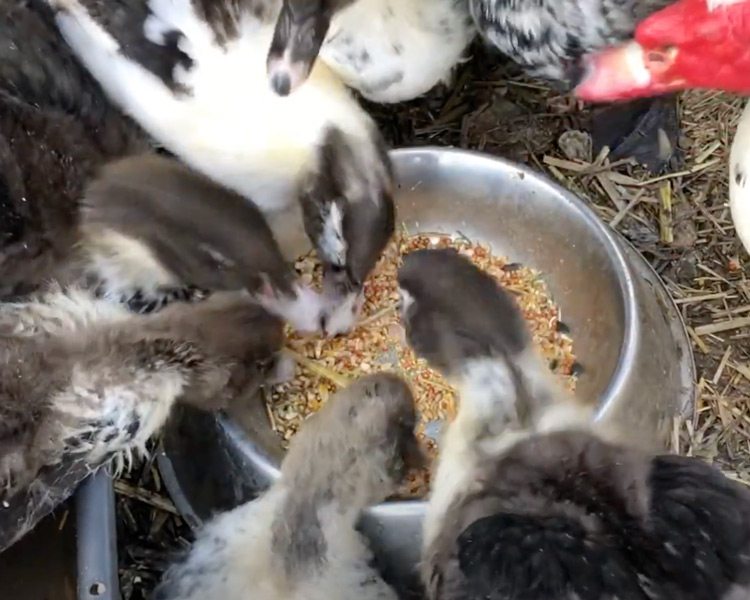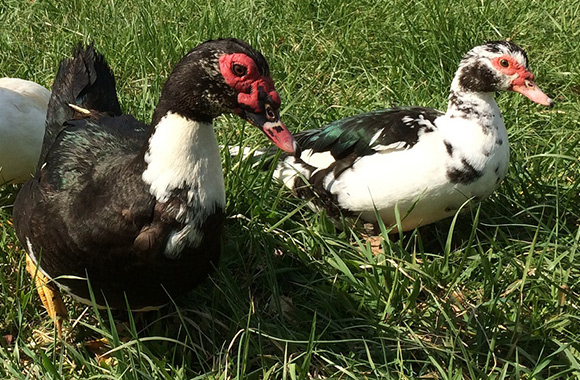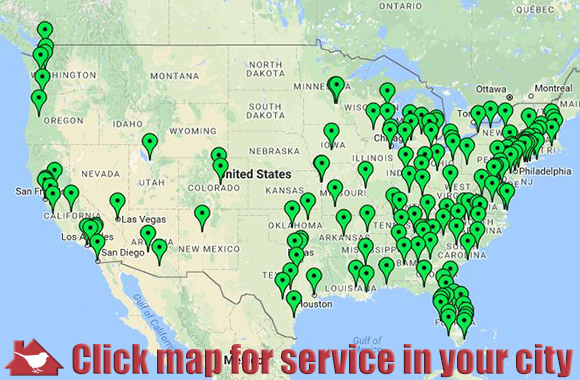Methods for control of Muscovy Ducks
Ducks are one of the most popular water birds in the US. They are kept around homes as pets, food, and eggs. They are fun to watch and feed. Unfortunately, as in the case of Muscovy Ducks, they can become feral, and breeding can get out of hand. Some feral populations can start to present serious problems. Muscovy ducks breed near any body of water. This can include urban and suburban lakes, farms areas, and backyards. They prefer nesting in tree cavities, but are can be happy on the ground, under bushes in your yard, even on balconies or under roof eaves. Problems arise from their aggressive behavior. This behavior can range from begging for food to protecting the nest/young. Another problem is the amount of mess created by droppings. An adult duck can produce around 1/3 lb dropping per day. Like most birds, they defecate anywhere. Pools, lakes, walkways, your porch….this presents a serious health hazard.
They are protected under the law, and guidelines exist as to legally restrict breeding, and eradication breeding control includes not feeding them, scaring them away from nesting areas with noise or other means, and vigorously shaking any eggs you find rendering them nonviable. Return eggs to the nest, or the mother will just lay more. If her eggs come up missing too many times, she will move her nest. You should let each duck hatch 2 ducklings... This is the major part of managing active nests. If the duck is allowed to incubate and hatch at least 2 ducklings. She will not abandon the nest and move on. By allowing her to hatch 2 eggs, you will ensure that this mom will spend 3-4 weeks incubating eggs, and another 12 weeks caring for her 2 ducklings.
This gives you 4 months in which she is not focused on nesting, but on caring for her young. If you shake all but 2 eggs, keep the unshaken eggs on top of or away from any other eggs. The “good” eggs should be labeled by crayon. One week after the female leaves the nest with her new ducklings, or about 45 days after incubation, the shaken eggs can be thrown out. WARNING: If you happen across a nest and are unsure as to how long the eggs have been incubating, DO NOT shakes them. If the embryo is too far along, rather than making the egg infertile, you may just cause the duckling to be hatched deformed.
Setting up loud noises or lots of activity to dissuade the ducks from settling on your property is another option. It can be as simple as a radio left on, or as elaborate as a commercial sonic emitter especially designed to scare off birds. Mylar flags or ribbons hung around your perimeter can be effective as well. Randomly tossing firecrackers or other noisemakers at the ducks is a great deterrent. Plan family events centered on outdoors. These can not only scare off the ducks, but promote family bonding. Barbeques, picnics, and outdoor games can be great fun and good exercise! The noise and activity also makes it uninviting to ducks. Leaving your dogs outside for extended periods can help to ward off these ducks as well. The Muscovy will view your dog as a natural predator and want to move on. Just remember Muscovy Ducks can be very aggressive, especially if protecting a nest or young. . Make sure your pets are safe!
Trapping the ducks is another option. One of The best ways to accomplish this is to assemble a large live trap with an exclusion type door. Using PVC or any type pipe, construct a large cage. The “walls” can be chicken wire or any type of sturdy mesh. The door of the cage will be a large wire or hardware cloth “funnel” with the small end inside the cage. When the ducks enter the trap via the funnel, they are unable to exit the same way. For bait use what they love. Muscovy will eat commercial bird feed, but they love BUGS. Slugs, larvae, grubs, flies, mosquitoes…you name it! Put your trap in an area with a high concentration of creepy crawly and they will be dying to get in. . If you wish to purchase a commercial trap, your local hardware or feed store can help. The will have a selection of live traps with triggered doors that will do the job as well.
Once have trapped your ducks, as long as they are on your land, you can relocate them, contain them, or eradicate them as you see fit. Another option is to eat both the ducks and their eggs. Muscovy eggs are a sought after delicacy, and it is said that it is hard to tell a sirloin steak from a Muscovy duck’s breast meat. Hunting ducks with guns has been considered sport for centuries.
Please keep in mind that poison and kill traps are not a good option. Besides being illegal, they pose a threat to other wild animals, pets, and humans as well. Don’t chance endangering yourself, your family, other animals, or the environment by trying to use any type of poison.

Muscovy ducks are quite rare in most places across the United States, but in the places they are seen, they are seen in abundance… and they can cause havoc in public spaces, back gardens, farms, and more.
The first thing that is probably bringing ducks into your garden is a source of food. If you remove that source of food, you will remove the attractant. They eat a combination of plant life and small animals, but they are becoming very familiar with human food. All human and pet food should be removed from the garden. Chicken feed should be swept away if it is not eaten. Bird feeders should be taken down until the problem is resolved.
Another thing that Muscovy ducks look for in a hang-out, is a large enough landing space. These are fairly large birds. An adult can have a wingspan up to five feet. They require a large space to land and take off. If you have a large area of open grass or patio, use garden furniture or other items to clutter it up. This is a temporary measure. If they can’t safely land in your garden, they aren’t going to hang out there.



